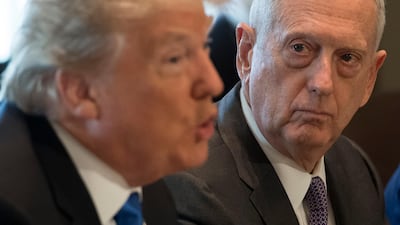Since Donald Trump took office almost a year ago, one of the most vexing questions has been: what will an "America first" foreign policy mean? With the administration torn between multiple competing power centres, unusually large gaps between rhetoric and reality and the inherent challenges of interpreting an essentially novel framework for US foreign policy, friend and foe alike have been left scratching their heads. Monday's release of the new US national security strategy document, the first since 2015, should, in theory, do much to clarify what a Trumpian foreign policy doctrine involves.
It will be scrutinised at home and abroad on three main criteria: how much it diverges from traditional US foreign policy; how interoperable and logically consistent its component parts seem and how well these ideas comport with the administration's practical actions and stated goals thus far.
While the 70-page text has been fairly closely-guarded, the outlines have become clear. The drafting has been led by Nadia Schadlow, senior director for strategy at the National Security Council, who is widely respected as an establishment conservative figure well-versed in traditional US and Republican Party foreign policy thinking. Therefore, it's not terribly surprising that much of the text frequently doesn't deviate dramatically from strategies issued by the George W Bush and Barack Obama administrations.
While the continuities will be marked, there will also be some significant distinctions. Perhaps most notably, and unsurprisingly, the Trump strategy will downplay, although not eliminate, several traditional pillars of US foreign policy, particularly the role of values and human rights and the importance of multilateral institutions, alliances and treaties.
Even more strikingly, the virtues of nationalism, and indeed parochialism, will be stressed at the expense of Washington’s traditional championing of a rules-based international order that promises win-win scenarios. Instead, much of this strategy will implicitly assume an anarchical international competition of all against all, with clear winners and losers fighting over limited and diminishing, rather than expanding, global prizes and resources.
Critics will protest a surrendering of principles while supporters defend clear-headed realism.
But passages reflecting this binary and narrow vision will coexist uneasily with much more familiar articulations of how American principles inform both US foreign policy conduct and goals. There is likely to be a considerable degree of dissonance throughout between the Trumpian “America first” impulse and more normative iterations of “Americanism” in foreign policy.
______________________
Read more from Opinion
Hessa Al Ghurair: Vision 2021 sends a strong message to enhance skills and find local talent
______________________
“America first” has not translated into neo-isolationism, either in theory or in practice. Indeed, “expanding American influence” is among four central pillars of the new strategy. But it has involved a retreat of American global authority - whether by ceding new space for Chinese leadership on trade and technological innovation, expanding Russian influence in Syria and the rest of the Middle East, or favouring narrow bilateral arrangements over more advantageous but far-reaching multilateral institutions and agreements.
Mr Trump’s political base may actually welcome this calculated international retreat, viewing it as an essential prelude to emphasising domestic priorities. What otherwise appears to be foreign policy self-mutilation is thereby perceived as a practical expression of “America first”.
But will the strategy help resolve some of the profound contradictions that have plagued Mr Trump’s foreign policies thus far?
Mr Trump has emphasised the need to enforce undefined limits on North Korea's nuclear programme. Indeed, his ally senator Lindsey Graham says there is a 30 per cent chance of a war over this, rising to 70 per cent if Pyongyang conducts another nuclear test. Yet Mr Trump has almost started a trade war with South Korea for reasons that remain essentially mysterious. The priorities appear muddied at best.
Similarly, in the Middle East, Mr Trump has cited defeating terrorism and confronting Iran as key goals, as will likely be reflected in the strategy. Yet Washington has all but labeled Syria – which is plainly the epicentre of the threats of ISIL and, especially, Al Qaeda, and the focus of Tehran’s expanding power and potential land-bridge to Lebanon and the Mediterranean Sea – to be essentially Russia’s “problem” and therefore Russia’s prerogative as well. Again, policy means and ends don’t seem to match up at all.
One of the most intriguing questions is whether the strategy will reflect the assessment being advanced by national security adviser HR McMaster that Turkey and Qatar have emerged – implicitly in coordination – as the primary funders and supporters of groups promoting radical, violent Islamist ideologies.
This is a welcome recognition of a real threat. But it’s also at odds with Washington’s increasingly “even-handed” approach to the boycott of Qatar, its continued embrace of Turkey, and, especially, Mr Trump’s endless praise of Recep Tayyip Erdoğan.
In all three cases, and many others, it’s hard to see how the broader goals can be achieved if more limited bilateral issues with Seoul, Moscow, Doha or Ankara, or a reticence to make hard choices, keep dominating the practical agenda.
A national security strategy should provide guidance and clarity. That has rarely been more needed. But the danger is that confusion will proliferate if the document seems internally inconsistent, reflects major dissonance between goals and policies, and sounds more like Mr Bush or Mr Obama than Mr Trump.


